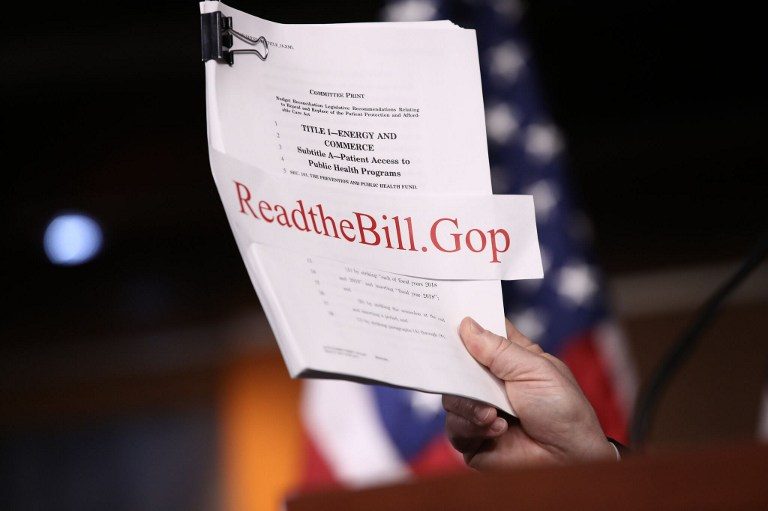SUMMARY
This is AI generated summarization, which may have errors. For context, always refer to the full article.

NEW YORK, USA – Amid the drive to repeal and replace Obamacare, the question remains whether President Donald Trump and the Republican-led Congress can bring down skyrocketing drug prices.
Recent controversies surrounding dramatic increases for prices of EpiPen and HIV drugs have placed pharmaceutical costs near the top of American public policy debates.
Trump has railed against the industry and vowed to bring prices down.
But experts say Trump will struggle to realize that goal due to a system that involves a complex web of players and incentives.
On Friday, March 10, he tapped Scott Gottlieb, a physician who has deep ties in the pharmaceutical industry, to head the Food and Drug Administration (FDA), a powerful regulatory agency.
US drugs often cost about two-and-a-half times what they cost in France or Britain, for instance. The difference is especially pronounced for cutting-edge remedies to treat cancer, rare illnesses and other maladies, such as hepatitis C.
Why is there such a big difference between drug prices in the United States and in Europe?
Unlike in France or Britain, there is no central public entity in the United States with the power to negotiate with private pharmaceutical companies.
Rather, the US market consists of multiple systems for different populations, each with their own rules:
– Private insurance: The biggest group of Americans get their health care through their employers via private insurers who negotiate drug prices with pharmaceutical companies.
Insurers also negotiate through intermediaries, such as pharmacy chains and pharmacy benefit management companies like Express Scripts.
– Medicaid: The public health program for the low-income population negotiates for drug prices at the federal or state level through a private intermediary.
– Medicare: The public health program for the elderly hires private companies to negotiate drug prices with pharmaceutical companies.
– Veterans Administration: A public health insurance system for those who have done military service, this program comes closest to the model employed in Europe on drug prices.
“The administration specifies the drugs they are going to cover and they basically set prices for these drugs,” Darius Lakdawalla, a professor at the University of Southern California, said of the VA.
Who sets drug prices?
Whether for generic drugs or those still under patent, drug companies have broad authority to set prices based on supply and demand, said Eric Lail of the insurance group Blue Cross and Blue Shield.
How are prices determined?
Pharmaceutical companies set prices on the basis of numerous factors, including costs in research and development, and in marketing.
The United States is one of the few industrialized economies to permit drug companies to directly advertise to consumers. New Zealand is another.
Yet to a large extent, drug prices are determined not by research and development costs, or the effectiveness of remedies, but “on the basis of what the market will bear,” concluded a 2016 paper by Harvard researchers Aaron Kesselheim, Jerry Avorn and Ameet Sarpatwari.
The paper said most blockbuster drugs are partly the result of public funding, either through subsidies or research funding.
For example, the lucrative Sovaldi hepatitis C drug now owned by Gilead Sciences has its origins in academic labs that received public support.
What other factors influence drug prices?
To stimulate innovation, the US FDA grants companies with patents 20 years of exclusivity before there can be a generic version.
Generic drugs also must complete a lengthy authorization process before they are permitted. In nearly 30 states, pharmacists also must receive approval from doctors before prescribing a generic drug, another hurdle to their use.
Within generics, “there has been a lot of consolidation,” said Lakdawalla. “As a result, there is no competition, so there is an opportunity for the companies to set higher prices.”
What leverage is available to private insurers?
The manufacturer sets the price and then negotiates with insurers, who typically win rebates that are not publicly disclosed, said Ed Schoonveld, a principal at ZS Associates, a sales and marketing consultancy.
Insurers have less leverage in cases where there is a drug with no direct competitor, said Lakdawalla.
What can be done to bring prices down?
“It will require a new law to make a major progress,” said Joshua Sharfstein, professor at Johns Hopkins Bloomberg School of Public Health. “I don’t expect this to be resolved anytime soon.”
“If the government does the negotiating, that only works if you are also going to let the government make the decision about what drugs people are going to use or not,” said Lakdawalla.
“I don’t know if Americans would appreciate that.”
Others recommend efforts to ease the path for generic drugs to come to market, or to reward companies with effective remedies and penalize those who sell drugs that underperform. – Rappler.com
Add a comment
How does this make you feel?
There are no comments yet. Add your comment to start the conversation.